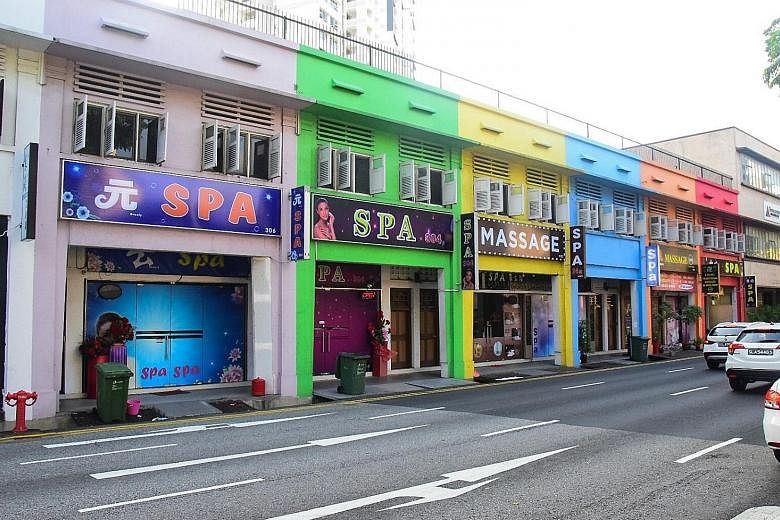From today, massage parlours with CaseTrust accreditation or which conduct their services in plain view will have their operating hours restricted from 7am to 10.30pm.
But those without the accreditation have to abide by even shorter hours - from 10am to 10.30pm.
This is a further restriction from what was implemented last August, where police allowed massage parlours in Housing Board estates to operate only from 6am to 11pm.
Only CaseTrust-accredited parlours in designated areas such as Orchard Road or Changi Airport, or those which do not require a massage establishment licence - like fish spas or nail salons - can continue to operate round the clock.
The tighter restrictions are the latest provisions under the new Massage Establishments Act, which was passed in November last year to crack down on vice activities and goes into force today.
The new laws come as police detected 40 per cent more unlicensed massage establishments between 2013 and 2016.
There were nearly 300 such operators found in 2016, with 40 per cent engaging in vice-related offences. In contrast, less than 3 per cent of licensed establishments were found to have vice-related infringements.
-
40%
The new laws come as police detected 40 per cent more unlicensed massage establishments between 2013 and 2016.
40%
There were nearly 300 such operators found in 2016, with 40 per cent engaging in vice-related offences.
3%
In contrast to the above, less than 3 per cent of licensed establishments were found to have vice-related infringements.
First-time offenders running an operation without a licence could now face a fine of up to $10,000 - 10 times higher than before - and up to two years in jail. Repeat offenders could have their penalties doubled or more: A fine of up to $20,000 and/or jail term of up to five years.
Landlords must now also take reasonable steps to get such errant tenants to hand over the premises within a month, or face the same penalties.
Should unlicensed operators continue to run their business after they have been charged, the police have warned that they can "use reasonable force" to have the premises vacated and physically secured.
Those that flout the order to stop operations may face a maximum fine of $15,000, imprisonment of up to three years, or both - a move meant to "prevent recalcitrant unlicensed massage establishment operators from blatantly breaching the law while court proceedings against them are still ongoing", the police said in a statement yesterday.
Besides the tighter operating hours, all parlours must not put up indecent advertisements.
These new conditions apply to existing licencees only when they renew their licences, unless they are in Housing Board estates, in which case these go into effect immediately.
Violating these conditions could see licencees fined up to $5,000, and for subsequent offences, up to $10,000 and/or jailed up to two years.
A licence may also be immediately suspended when a licencee or relevant person is charged with serious offences such as human trafficking or organised crime.
There will be some leeway, however. Some activities, like those in fish spas or manicure services, no longer require a licence, while other massage activities will be exempt from some rules if, for example, they are provided at hospitals or traditional Chinese medicine clinics.
In addition, operators that require a licence and maintain a good track record could receive licences with validity periods longer than the standard one-year period.


